|
 Leo
Tolstoy Leo
Tolstoy
Leo Tolstoy is a Russian author, one of the greatest of
all novelists. Tolstoy's life in often seen to form two distinct
parts: first comes the author of great novels, and later a
prophet and moral reformer.
Leo Tolstoy (1828-1910) was born at Yasnaya Polyana, in
Tula Province, the fourth of five children. The title of Count
had been conferred on his ancestor in the early 18th century
by Peter the Great. His mother shortly
passed away and having no surviving photographs Tolstoy had
no recollection of what his mother looked liked.
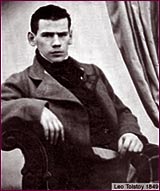 At
age nine the family rented a house and moved to Moscow. Soon
his father "turned up dead" while visiting a friend.
Shortly afterwards his grandmother passed away. At
age nine the family rented a house and moved to Moscow. Soon
his father "turned up dead" while visiting a friend.
Shortly afterwards his grandmother passed away.
Losing two close family member in such a short period of
time Tolstoy began formulating serious ideas about death and
happiness.
In 1844 Tolstoy started his studies of law and oriental
languages at Kazan University, but he never took a degree,
dissatisfied with the standard education. In 1857 he visited
France, Switzerland, and Germany. After his travels Tolstoy
settled in Yasnaya Polyana, where he started a school for
peasant children. He saw that the secret of changing the world
lay in education. He investigated during further travels to
Europe (1860-61) educational theory and practice, and published
magazines and textbooks on the subject. In 1862 he married
Sonya Behrs, who bore him 13 children. Sonya also acted
as her husband's devoted secretary.
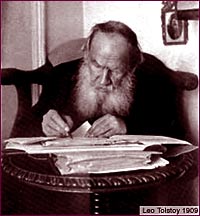 Tolstoy's
fiction grew originally out of his diaries, in which he tried
to understand his own feelings and actions so as to control
them. He read widely fiction and philosophy - Plato and Rousseau,
Dickens and Sterne; through the 1850s he also read and admired
Goethe, Stendhal, Thackeray, and George Eliot. Tolstoy's
fiction grew originally out of his diaries, in which he tried
to understand his own feelings and actions so as to control
them. He read widely fiction and philosophy - Plato and Rousseau,
Dickens and Sterne; through the 1850s he also read and admired
Goethe, Stendhal, Thackeray, and George Eliot.
Tolstoy's major work, "War and Peace", appeared
between the years 1865 and 1869. The epic tale depicted the
story of five families against the background of Napoleon's
invasion of Russia. Its vast canvas includes 580 characters,
many historical, others fictional. The story moves from family
life to the headquarters of Napoleon, from the court of Alexander
l to the battlefields of Austerlitz and Borodino.
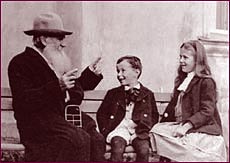 Tolstoy's
other masterpiece, "Anna Karenina", which stands
alongside Flaubert's Madame Bovary, as perhaps the most prominent
19th-century European novel of adultery. The novel opens with
the famous sentence: "Happy
families are all alike, every unhappy family is unhappy in
its own way." Tolstoy juxtaposed in the work
crises of family life with the quest for the meaning of life
and social justice. Tolstoy's
other masterpiece, "Anna Karenina", which stands
alongside Flaubert's Madame Bovary, as perhaps the most prominent
19th-century European novel of adultery. The novel opens with
the famous sentence: "Happy
families are all alike, every unhappy family is unhappy in
its own way." Tolstoy juxtaposed in the work
crises of family life with the quest for the meaning of life
and social justice.
Tolstoy's novels promote critical thinkings, empathy
and in the process, contribution to peace. Sometimes Tolstoy
comes across as a bit preachy, but he is nevertheless one
of the greatest writers. He presents a range of thought-provoking
ideas and writes in a beautifully descriptive style.
In the 1880s Tolstoy wrote such philosophical works
as "A Confession" and "What I Believe in",
which were banned in 1884. He started to see himself more
as a sage and moral leader than an artist. In 1884 occurred
his first attempt to leave home. He gave up his estate
to his family, and tried to live as a poor, celibate peasant.
Attracted by Tolstoy's writings, Yasnaya Polyana was visited
by hundreds of people from all over the world. Tolstoy's teachings
influenced Gandhi in India, and the kibbutz movement in Palestine,
and in Russia his moral authority rivaled that of the tsar.
After leaving his estate on the urge to live as a wandering
ascetic, Tolstoy died of pneumonia on November 7, 1910, at
a remote railway junction. Eight years after his death, his
wife was heard to remark, "I
lived with Leo for forty-eight years, but I never really lerned
what kind of a man he was."
Tolstoy's collected works, which were published in
the Soviet Union in 1928-58, consisted of 90 volumes.

|

|
|
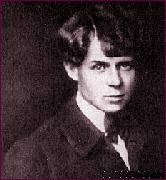 Sergey
Esenin Sergey
Esenin
Sergey Esenin (1895-1925) is without doubt the most profoundly
Russian of all the poets of the Revolution.
Sometimes dismissed by elitist poetic circles, Yesenin was
in fact an extremely gifted lyricist, an intellectual and
a celebrity. He was the poet of the people, not only during
the early days of the Revolution but long after his death
in 1925 at age 30. His poetry survived through the Stalinist
period, despite official disapproval of his works. His little
books of poetry, often in tatters, could be found in the hands
of migrant workers and Red Army soldiers. Many of his poems
are learnt by heart at school. They have been set to music
and are popular songs in modern Russia. His poetry, deceptively
simple in structure, is fresh, sincere, melancholy and full
of fire.
Sergey Esenin was born on 3 October 1895
in the village of Konstantinovo in the Ryazan province. In
1899, he went to live with his maternal grandparents. His
chilhood was full of strange events. When he was three and
a half, his uncles put him on a horse with no saddle and set
it galloping off. Young Sergei had to hold on for dear life.
He learned to swim in a similar fashion. They took him out
in a boat, stripped him naked, and tossed him into the water.
When he was eight, he would act as hunting dog for an uncle,
swimming in the lake after ducks which had been shot. He
began writing poetry when he was nine.
He was a striking figure with his blonde hair like fields
of rye, sparkling cornflower blue eyes, beautiful looks and
a deep resonant voice. Donned in his blue peasant blouse,
with golden silk cord, he attracted huge admiring audiences
wherever he traveled in Russia.
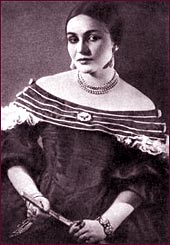 In
1914 he married Anna Izryadnova, and they had a son in January
of 1915. Izryanova describes Esenin as arrogant, proud, ambitious,
and possessive. Soon, he abandoned the family and Moscow for
Petrograd (later renamed to St.
Petersburg), which he saw as the real literary capital.
On 9 March 1915 he met with famous poet Blok, who gave Esenin
encouragement and help, calling him a "naturally
gifted peasant poet". In
1914 he married Anna Izryadnova, and they had a son in January
of 1915. Izryanova describes Esenin as arrogant, proud, ambitious,
and possessive. Soon, he abandoned the family and Moscow for
Petrograd (later renamed to St.
Petersburg), which he saw as the real literary capital.
On 9 March 1915 he met with famous poet Blok, who gave Esenin
encouragement and help, calling him a "naturally
gifted peasant poet".
Esenin was married five times in his short but very full
life. His second wife was Zinaida Riykh, an actress. They
were married in 1918 and she bore him a daughter Tatiana and
a son Konstantin the following year. He was divorced from
Riykh in October 1921 at the time when he first became acquainted
with Isadora Duncan, the famouse American dancer. In 1922
they were married and sailed for America.
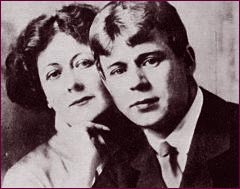 Their
short stormy marriage was more remarkable, not that he was
17 years younger, but because he spoke no English and she
no Russian. Their
short stormy marriage was more remarkable, not that he was
17 years younger, but because he spoke no English and she
no Russian.
Traveling with her on dance tours, he acted the role
of the hooligan in the most fashionable hotels and restaurants
in America and Europe. He feared losing his spiritual sense
of art. As his mental and physical health declined, he and
Duncan returned to Paris. His struggles with drinking continued
and one night, he smashed all the mirrors and woodwork in
his room at the Crillon Hotel. Influential friends succeeded
in freeing Esenin from the police, and Duncan moved him to
a mental hospital. By August 5th 1923, they were back in Moscow.
By the end of October, their relationship was over.
I don't pity, don't call, don't cry,
All will be gone, like haze from the white apple trees.
Seized by the gold of withering,
I will never be young again.
Next there was a civil marriage to Galina Benislavskaya,
his secretary. Also in that same year he had a son Alexander
by the poet Nadezhda Volpin. Esenin never saw his son Alexander.
Ironically, Alexander Volpin-Esenin later became a well known
poet in the dissident movement in Russia in the 1960s. In
March 1925, Yesenin became acquainted with the grandaughter
of Leo Tolstoy, Sophia Tolstoya.
She became his last wife.
In 1918 or 1919, Esenin applied to join the Communist
Party, but he was considered too individual and "alien
to any and all discipline". His collection
"Hooligan's Confession" was published in 1921.
Despite his intensely social life, slowly, a sense
of alienation and lonliness grew in him. In 1921 he notes,
"Generally speaking, a lyric
poet should not live long." Esenin was bored
and deeply depressed, suffering from alcoholism and hallucinations.
He took a room in the Hotel d'Angletrre, and hung himself
from the water pipes in the icon corner on December 28, 1925.
He left a suicide poem written in his own blood. He was
only 30 years old.

|
|
|

Poet Aleksander Pushkin, Palekh
School of painting.
|

|
|
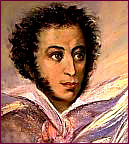 Aleksander
Pushkin Aleksander
Pushkin
"Live by the pen; die by the
sword" - This statement directly applies to
the way Alexander Pushkin (1799-1837) lived his life.
The greatest poet in Russian history lived his life
just like it would have happened to a romantic character in
one of his stories or poems. Greatly influenced by his heritage
and by one of the greatest Romantic poets of all time, Lord
Byron, Pushkin breathed life, adventure, and personal anguish
into his literature. Using his great knowledge of his native
language and blending it in with raw emotion and romantic
ideals made Pushkin the most explosive and influential writer
to have ever been born as a Russian. Pushkin wrote some
800 lyrics with a dozen narrative poems.
"Love passed, the muse appeared,
the weather
of mind got clarity newfound;
now free, I once more weave together
emotion, thought, and magic sound."
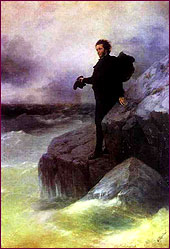 Pushkin
was not outwardly attractive, but his demeanor and charm was
able to win over the heart of any woman. As soon as Pushkin
was outside the confines of the Lyceum he was able to live
out his playboy lifestyle. He had affairs with many women
and many lovers that all found it hard to resist his smooth
talking style and the passion in his eyes. He even kept a
list for himself that divided the women who he had sexual
relations with and the relationships that were purely platonic. Pushkin
was not outwardly attractive, but his demeanor and charm was
able to win over the heart of any woman. As soon as Pushkin
was outside the confines of the Lyceum he was able to live
out his playboy lifestyle. He had affairs with many women
and many lovers that all found it hard to resist his smooth
talking style and the passion in his eyes. He even kept a
list for himself that divided the women who he had sexual
relations with and the relationships that were purely platonic.
His leisurely lifestyle and his provocative literature
eventually earned him an exile that was implemented by the
Tsar. The Tsar and the authorities, felt that it would be
better to have Pushkin stationed in the south of Russia so
as not to add fuel to the talk of revolution and reform. Pushkin
was sent to the small town of Kishinev where he was in no
mood to slow down his fast paced life.
|
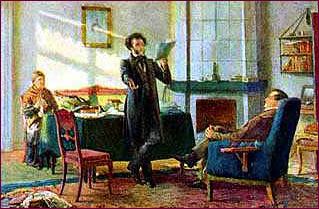
He fought in many duels, had more affairs, and was heavy
into gambling. At one of his duels he arrived late eating a
bag of cherries. Taunting the officer by spitting the pits in
his direction he avoided a gunshot wound when the officer fired
and missed. Without even returning the gunfire he nonchalantly
walked away from the duel still eating his cherries.
|
|
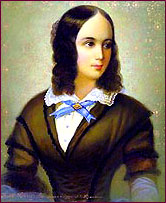 In
the winter of 1828 Russia's most famous poet laid his eyes
upon his future wife, Natalia Goncharova (1812-1863), who
was 16 at a time, and was rumored to be the most beautiful
woman in Moscow. At that time Natalia still had not read
any of Pushkin's poetry. He met her at the first ball that
she attended and from the first moment his intentions were
to marry her. For the next two years Pushkin would be in pursuit
of Natalia until her mother finally agreed for the couple
to marry. In
the winter of 1828 Russia's most famous poet laid his eyes
upon his future wife, Natalia Goncharova (1812-1863), who
was 16 at a time, and was rumored to be the most beautiful
woman in Moscow. At that time Natalia still had not read
any of Pushkin's poetry. He met her at the first ball that
she attended and from the first moment his intentions were
to marry her. For the next two years Pushkin would be in pursuit
of Natalia until her mother finally agreed for the couple
to marry.
Two days before the ceremony the poet went to see Nashchokin,
who had a famous Gypsy singer, Tatyana Demyanova, staying
with him. Pushkin was rather melancholy, and said to Tatyana:
"Tanya, sing me something to
bring me happiness; perhaps you've heard I'm getting married."
So, in a rather melancholy way, she sang a song
which people said was a bad omen. Suddenly, listening to the
song, Pushkin began to sob his heart out. Nashchokin ran over
to him. Pushkin said: "This
song has turned my insides out. It foretells of a great loss."
Prior to this insident, a fortune teller predicted
poet an early death, which involved his wife.
At the wedding in 1831 ceremony a few bad omens fell
upon the service. Pushkin's ring fell to the floor and his
candle blew out. Pushkin took this very seriously, which he
saw as signs of the problems that were to come.
After wedding, Natalia continued to frequent St.
Petersburg's balls and social royal functions, which made
her an object of the Tsar's affection. Rumors of her numerous
affairs made life for Pushkin miserable. Among her affectionate
followers was the French baron Dantes. Eventually the allegations
of her romance with the Frenchman led to a duel between Dantes
and Pushkin, who ended up fatally wounded.
|
|
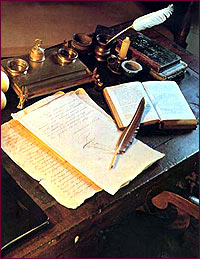 Russia's
most famous poet died two days later with his wife at his
bedside along with many of his close friends. At the age of
37 Pushkin's fate had been acted out like that of a romantic
character in one of his poems or novels. As Pushkin passed
from one life to another Natalia was in tears, kissing his
forehead, chest and arms. She cried for him to forgive her. Russia's
most famous poet died two days later with his wife at his
bedside along with many of his close friends. At the age of
37 Pushkin's fate had been acted out like that of a romantic
character in one of his poems or novels. As Pushkin passed
from one life to another Natalia was in tears, kissing his
forehead, chest and arms. She cried for him to forgive her.
He was buried at his family estate in Mikhailovskoe,
where he spent two years of his exile, where he found his
love for literature in his father's library, and where his
creative energy was structured by his nanny with her fantastic
stories.
|
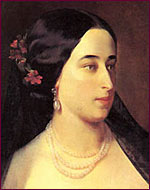 Pushkin's
eldest daughter, Maria Gartung, who didn't even remember her
famous father, left live flowers by his monument in Moscow
almost every day of her life. Flowers were missing the day she
died. When Leo Tolstoy met Maria
Gartung, he was taken by her beauty and intellegence. His Anna
Karenina charecter was based on Maria Gartung. Pushkin's
eldest daughter, Maria Gartung, who didn't even remember her
famous father, left live flowers by his monument in Moscow
almost every day of her life. Flowers were missing the day she
died. When Leo Tolstoy met Maria
Gartung, he was taken by her beauty and intellegence. His Anna
Karenina charecter was based on Maria Gartung. |

|
Links
To learn more about Leo Tolstoy check out www.ltolstoy.com,
his
biography, about Pushkin Puchkin
and Lyceum, To learn more about Soviet writers check out
Enciclopedia
of Soviet writers. (English). |
|



